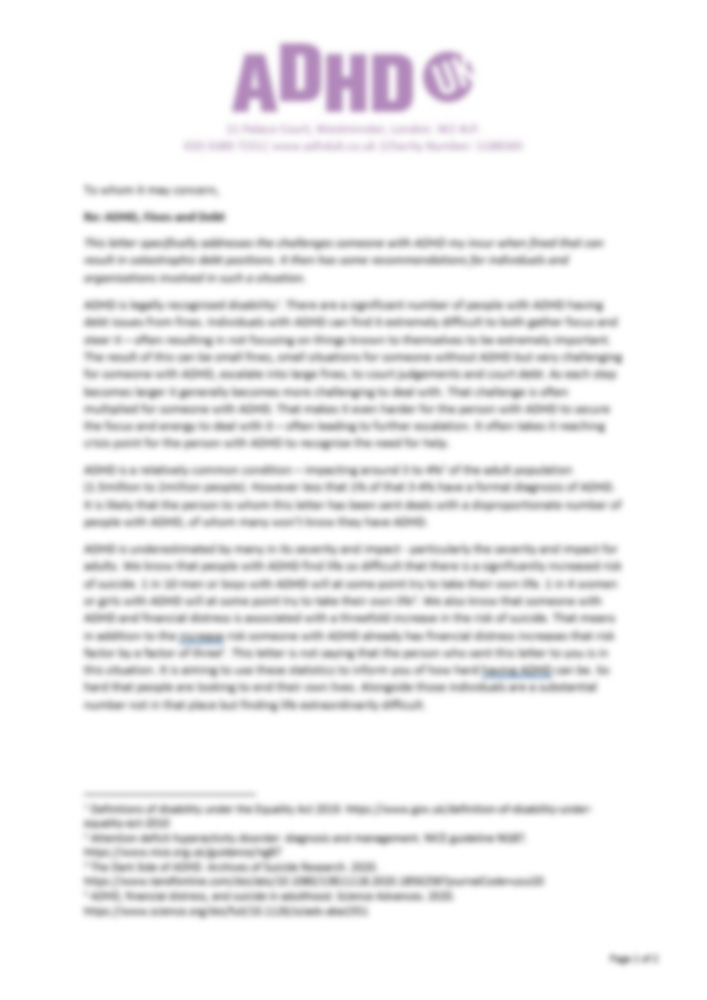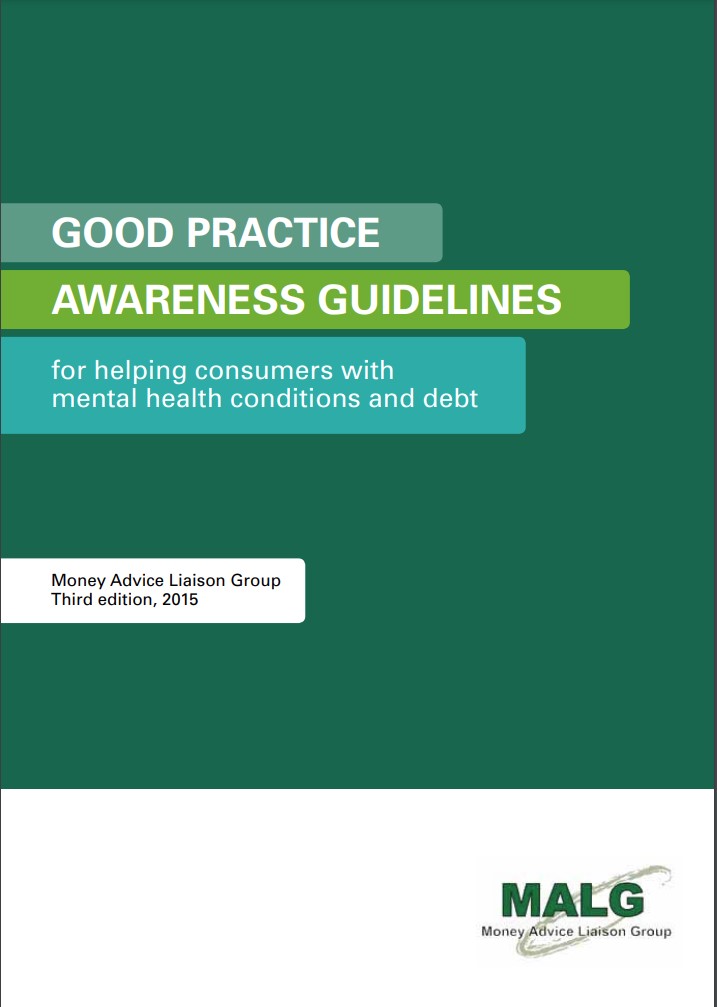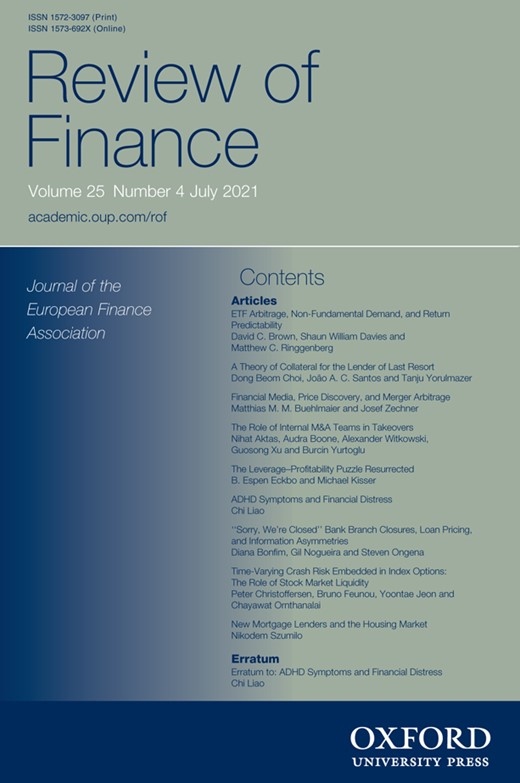ADHD Debt/Fines – Appeal Support Letter
This letter has been designed to provide support for individuals who have issues around debt – in particular debt that has occurred from fines and the esclation of costs that can occur for someone with ADHD.
The full text is below. You can download a pdf letter here (with some personalisation options) or by clicking the image to the right.
You may also benefit from speaking to a specialist debt advice charity (Such as StepChange). They can also provide information about “Breathing Space” the government debt respite scheme that amongst other provisions specifically provides for a mental health crisis breathing space.
To whom it may concern,
Re: ADHD, Fines and Debt
This letter specifically addresses the challenges someone with ADHD my incur when fined that can result in catastrophic debt positions. It then has some recommendations for individuals and organisations involved in such a situation.
ADHD is legally recognised disability[1]. There are a significant number of people with ADHD having debt issues from fines. Individuals with ADHD can find it extremely difficult to both gather focus and steer it – often resulting in not focusing on things known to themselves to be extremely important. The result of this can be small fines, small situations for someone without ADHD but very challenging for someone with ADHD, escalate into large fines, to court judgements and court debt. As each step becomes larger it generally becomes more challenging to deal with. That challenge is often multiplied for someone with ADHD. That makes it even harder for the person with ADHD to secure the focus and energy to deal with it – often leading to further escalation. It often takes it reaching crisis point for the person with ADHD to recognise the need for help.
ADHD is a relatively common condition – impacting around 3 to 4%[2] of the adult population (1.5million to 2million people). However less that 1% of that 3-4% have a formal diagnosis of ADHD. It is likely that the person to whom this letter has been sent deals with a disproportionate number of people with ADHD, of whom many won’t know they have ADHD.
ADHD is underestimated by many in its severity and impact – particularly the severity and impact for adults. We know that people with ADHD find life so difficult that there is a significantly increased risk of suicide. 1 in 10 men or boys with ADHD will at some point try to take their own life. 1 in 4 women or girls with ADHD will at some point try to take their own life[3]. We also know that someone with ADHD and financial distress is associated with a threefold increase in the risk of suicide. That means in addition to the increase risk someone with ADHD already has financial distress increases that risk factor by a factor of three[4]. This letter is not saying that the person who sent this letter to you is in this situation. It is aiming to use these statistics to inform you of how hard having ADHD can be. So hard that people are looking to end their own lives. Alongside those individuals are a substantial number not in that place but finding life extraordinarily difficult.
This letter serves to explain a little about ADHD and how significant the impact is on someone’s life. That someone with ADHD has a disability that can impair their ability to process fines properly. That same impairment further challenges them to deal with the consequences of not paying. This can result in significant debt spirals.
Every situation is unique and we ask you to use your judgement in the case in front of you. Our general recommendations are:
- To recognise the obligations under the 2010 Equality Act to provide reasonable accommodations to those with a disability and that not doing so appropriately may be an act of discrimination.
- To separate the consideration of the event that caused the fine and the fine process itself.
- To recognise the challenge of ADHD in dealing with the fine and wind back the clock to the starting point of the fine process. In doing so to allow the individual the option to appeal the original issue or pay the original fine. In our experience most individuals are primarily looking for the opportunity to correct their process mistakes and pay the original fine.
- To provide the individual with an opportunity to speak with someone should the individual feel the need to. Ideally that person should have specialist training in understanding the challenges for someone with ADHD.
- Where you have someone who is on the NHS waitlist for an ADHD assessment but has not yet been formally diagnosed we recommend you provide them with the accommodations of someone with ADHD or pause the process until the NHS diagnosis has completed. We recommend the former as the current NHS waitlist in most areas in measured in years and potential cumulative damage of leaving such a situation unresolved should be factored in.
- Lastly, to consider the wider process and what considerations for people with ADHD you have
Thank you for your time and consideration in this matter.
Kind regards,
ADHD UK
_____________________________
[1] Definitions of disability under the Equality Act 2019. https://www.gov.uk/definition-of-disability-under-equality-act-2010
[2] Attention deficit hyperactivity disorder: diagnosis and management. NICE guideline NG87. https://www.nice.org.uk/guidance/ng87
[3] The Dark Side of ADHD. Archives of Suicide Research. 2020. https://www.tandfonline.com/doi/abs/10.1080/13811118.2020.1856258?journalCode=usui20
[4] ADHD, financial distress, and suicide in adulthood. Science Advances. 2020. https://www.science.org/doi/full/10.1126/sciadv.aba1551
For organisations involved in debt for further reading you can see the Good Practice Awareness Guidelines from the Money Advice Liason Group.
Research: ADHD Symptoms and Financial Distress (April 2020)
Review of Finance, Volume 25, Issue 4, July 2021, Pages 1129–1210.
This research shows the people with ADHD have more difficulty paying bills and more likely to be deliquent on those payments. It is clear evidence of the impact of ADHD as a disability in bill paying and consequent debt.


